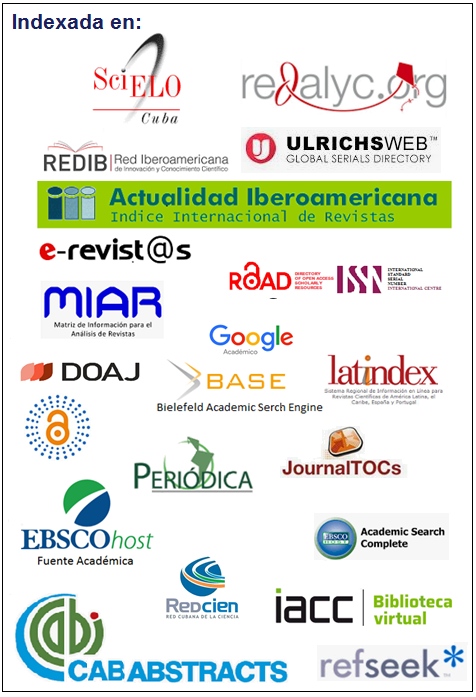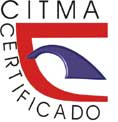Integrating disaster risk reduction and climate change adaptability policies in coastal municipalities
Keywords:
local development, risk studies , municipal government , coastal vulnerability , coastal zonesAbstract
This paper analyzes the importance of integrating disaster risk reduction and climate change adapting policies into the socio-economic development plans of coastal municipalities in Cuba. To this end, a literature review was carried out to locate the main theoretical and bibliographical sources on Disaster Risk Reduction, Climate Change Adaptation, coastal municipalities and government policies and triangulate them to create a four-phase integration tool. This tool will improve the territorial development plans and make them more effective while promoting an integrated vision of disaster risk reduction and adapting to climate change as a fundamental basis for the sustainability of development in Cuba.Downloads
References
Alocado-Menéndez, P.M. (2015). Escenarios de peligro y vulnerabilidad de la zona costera cubana, asociados al ascenso del nivel medio del mar para los años 2050 y 2100. Glosario de términos macroproyecto. La Habana.
CITMA. (2017). Enfrentamiento al Cambio Climático en la República de Cuba. Tarea Vida. Ministerio de Ciencia, Tecnología y Medio Ambiente. https://www.citma.gob.cu/tarea-vida-4/
Díaz, P. L. (2018). La educación en riesgos climáticos: una experiencia en la Universidad de Matanzas. Universidad y Sociedad, 10(5), 100-105. https://rus.ucf.edu.cu/index.php/rus/article/view1030
García-Acosta, V. (2005). El riesgo como construcción social y la construcción social de riesgos. Revista Desacatos, 19, 11-24. http://www.redalyc.org/articulo.oa?d=13901902
González Camacho, G., Olivera Ranero, A., Pando Echemendía, Castelo, R.J. y Martínez Nodarse, G. M. (2020). El desafío de la gestión del riesgo de desastre en la sostenibilidad de asentamientos costeros. Arquitectura y Urbanismo, 41(2), 05-16. https://rau.cujae.edu.cu/index.php/revistaau/article/view/574
Juanes-Martí, J. L. (2019). Experiencias cubanas en el enfrentamiento a la erosión costera. Revista Comunicaciones Científicas y Tecnológicas, 4(1), 317–321. https://revistas.ues.edu.sv/index.php/comunicaciones/article/view/1470
Lavell, A. (2001). Sobre la Gestión del Riesgo: Apuntes hacía una definición Biblioteca Virtual en Salud de desastres-OPS, 4, 1-22 http://www.bvsde.paho.org/bvsacd/cd29/riesgoapuntes.pdf
Moré Estupiñán, M., Fragoso Martínez, E. J., & Santos Abreu, I. C., (2023). La educación para el cambio climático en la creación de capacidades para el desarrollo local. Revista Universidad y Sociedad, 15(1), 549-559. https://rus.ucf.edu.cu/index.php/rus/article/download/3535/3478
Paredes Chi, A.A., Vidal Hernández, L., de Yta Castillo, D., Cuevas Jiménez, A. & Hernández Herrera, I. (2022). ¿Qué podemos hacer para afrontar el cambio climático en la zona costera? Revista Digital Universitaria, 23(4), 1-11. http://doi.org/10.22201/cuaieed.16076079e.2022.23.4.8
Paz, O., Arana, I., Quispe, J. Ocampo, J., Clot, N. & Galvez, V. (2014). Guía orientativa de incorporación de la Reducción del Riesgo de Desastres (RRD) y la Adaptación al Cambio Climático (ACC) en Planes de Desarrollo Municipales y Departamentales. HELVETAS Swiss Intercooperation. https://www.shareweb.ch/site/disasterriskreduction/thermes-and-resources/DOC_thermesresources/Thermes-and-resources/Guia%20Orientativa_Bolivia_incorporacionRRD-ACC_SDC-Helvetas_2014.pdf
Pérez Figueredo, A. S. (2021). Los riesgos costeros: Retos para el desarrollo sostenible del turismo en los territorios insulares en el contexto del cambio climático. Explorador Digital, 5(1), 317-333. https://doi.org/10.33262/exploradordigital.v5i1.1505
Pérez Montero, O., Milanés, C., Mateo, C., Planas, J. A., Velázquez, Y. R., Pérez, A. S., Alarcón, R., Chuy, T., Silva L., Mesa, L., Cruz, Y., Tamayo, H., Ferrera, A., Ravelo, Á., Brito, A., Cid, J. R., García, L., Carbonero, M. & Szlafsztein, C. (2021). Aportes para la gobernabilidad y gobernanza de los riesgos en naciones insulares y continentales costeras. Anales de la Academia de Ciencias de Cuba; 11, (3), 1-7. https://revistacuba.sld.cu/index.php/revacc/article/view/1048
Plan Nacional de Desarrollo Económico y Social hasta el 2030. https://www_presidencia.gob.cu/es/gobierno/plan-nacional-de-desarrollo-economico-y-social-hasta-el-2030/
Queiroz-de Almeida, L., da Silva Costa, M.R.P., Rodrigues Feitosa Frazão, A.P., Gondim de Freitas, A., Azevedo de Souza, E., Lima de Souza, J., Silva de Matos, L., da Silva Juvenal, P.H., Gomes da Silva, J. & Baptista Tirelo, T.S. (2023). Riesgo de desastre y cambio climático: Un breve análisis a partir del estudio de caso de Galinhos, Brasil. Revista de Estudios Latinoamericanos sobre Reducción del Riesgo de Desastres REDER, 7(2), 111-125. https://doi.org/10.55467/reder.v7i2.12
Rodríguez, A., Muñoz, M., Carballo, J. A., Barrios, D.& Olmo, A. (2023). Sistema de indicadores para el diseño y evaluación de proyectos para la adaptación al cambio climático en municipios costeros de La Habana. Estudios del Desarrollo Social: Cuba y América Latina, 11 (3), 131-150. https://revistas.uh.cu/revflacso/article/view/7817
United Nations. (2018). Implementation of the Sendai Framework for Disaster Risk Reduction 2015–2030. A/73/268. Seventy-third session General Assembly. https://www.unisdr.org/files/resolutions/N1824255-en.pdf
Velázquez-González, K., Adame-Martínez, S., Hoyos Castillo, G. & Seingier, G. (2021). Resiliencia de los municipios costeros del Pacífico mexicano. Economía, Sociedad y Territorio, 21(5), 205-238. https://doi.org/10.22136/est20211648
Published
How to Cite
Issue
Section
Copyright (c) 2024 Rudy Montero Mata, Rafael Miguel Guardado-Lacaba

This work is licensed under a Creative Commons Attribution-NonCommercial 4.0 International License.
- Authors retain copyright and guaranteeing the right magazine to be the first publication of the work as licensed under a Creative Commons Attribution-NonCommercial that allows others to share the work with an acknowledgment of the work's authorship and initial publication in this journal.
- Authors may establish separate supplemental agreements for the exclusive distribution version of the work published in the journal (eg, place it in an institutional repository or publish it in a book), with an acknowledgment of its initial publication in this journal.
- Authors are allowed and recommended to disseminate their work through the Internet (e.g., in institutional telematic archives or on their websites) before and during the submission process, which can produce interesting exchanges and increase citations of the published work. (See The effect of open access)



